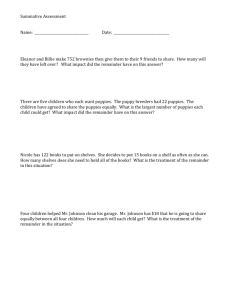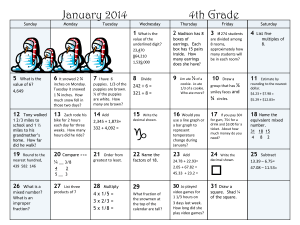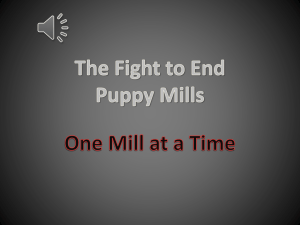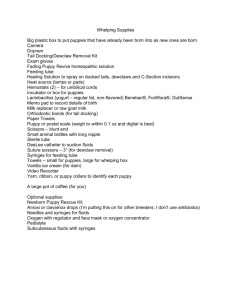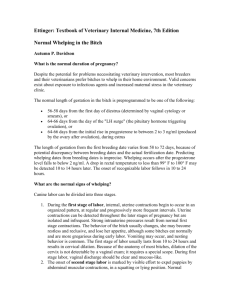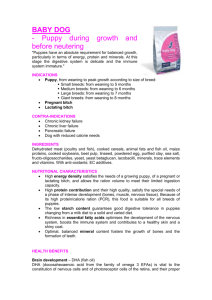Caesarean Section Post Operative Instructions
advertisement
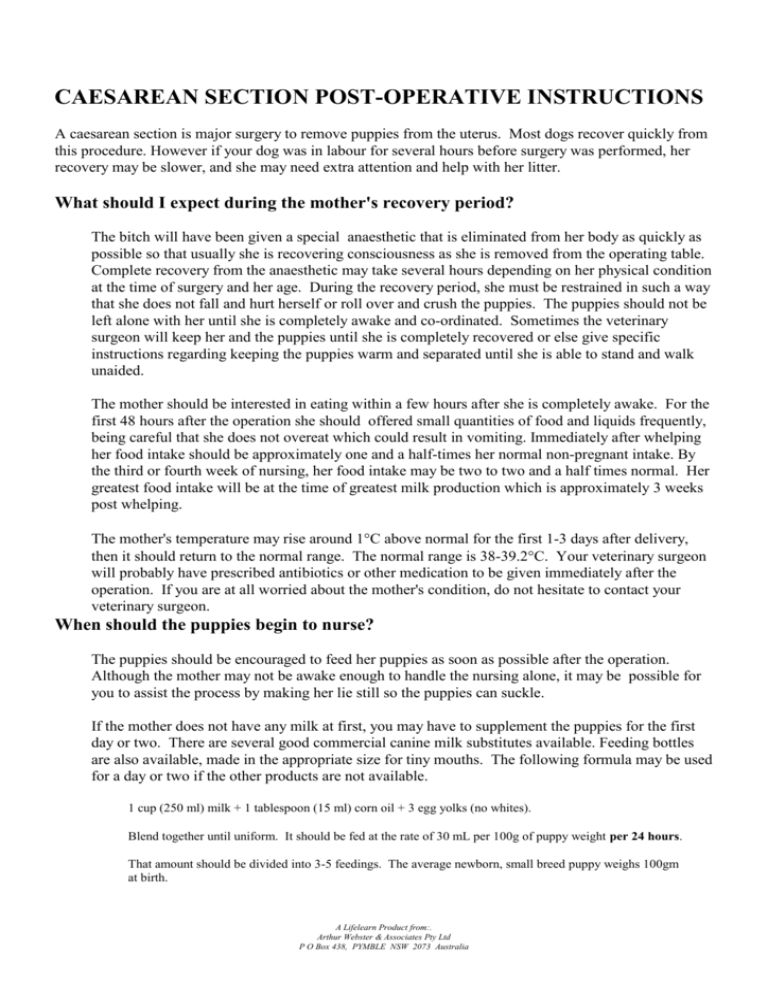
CAESAREAN SECTION POST-OPERATIVE INSTRUCTIONS A caesarean section is major surgery to remove puppies from the uterus. Most dogs recover quickly from this procedure. However if your dog was in labour for several hours before surgery was performed, her recovery may be slower, and she may need extra attention and help with her litter. What should I expect during the mother's recovery period? The bitch will have been given a special anaesthetic that is eliminated from her body as quickly as possible so that usually she is recovering consciousness as she is removed from the operating table. Complete recovery from the anaesthetic may take several hours depending on her physical condition at the time of surgery and her age. During the recovery period, she must be restrained in such a way that she does not fall and hurt herself or roll over and crush the puppies. The puppies should not be left alone with her until she is completely awake and co-ordinated. Sometimes the veterinary surgeon will keep her and the puppies until she is completely recovered or else give specific instructions regarding keeping the puppies warm and separated until she is able to stand and walk unaided. The mother should be interested in eating within a few hours after she is completely awake. For the first 48 hours after the operation she should offered small quantities of food and liquids frequently, being careful that she does not overeat which could result in vomiting. Immediately after whelping her food intake should be approximately one and a half-times her normal non-pregnant intake. By the third or fourth week of nursing, her food intake may be two to two and a half times normal. Her greatest food intake will be at the time of greatest milk production which is approximately 3 weeks post whelping. The mother's temperature may rise around 1C above normal for the first 1-3 days after delivery, then it should return to the normal range. The normal range is 38-39.2C. Your veterinary surgeon will probably have prescribed antibiotics or other medication to be given immediately after the operation. If you are at all worried about the mother's condition, do not hesitate to contact your veterinary surgeon. When should the puppies begin to nurse? The puppies should be encouraged to feed her puppies as soon as possible after the operation. Although the mother may not be awake enough to handle the nursing alone, it may be possible for you to assist the process by making her lie still so the puppies can suckle. If the mother does not have any milk at first, you may have to supplement the puppies for the first day or two. There are several good commercial canine milk substitutes available. Feeding bottles are also available, made in the appropriate size for tiny mouths. The following formula may be used for a day or two if the other products are not available. 1 cup (250 ml) milk + 1 tablespoon (15 ml) corn oil + 3 egg yolks (no whites). Blend together until uniform. It should be fed at the rate of 30 mL per 100g of puppy weight per 24 hours. That amount should be divided into 3-5 feedings. The average newborn, small breed puppy weighs 100gm at birth. A Lifelearn Product from:. Arthur Webster & Associates Pty Ltd P O Box 438, PYMBLE NSW 2073 Australia In an emergency canned evaporated milk can be used reconstituted at double the normal strength. Although it is desirable for puppies to begin nursing immediately, a healthy newborn can survive nicely for up to 12 hours without nursing. However, if the newborn is weak, dehydrated, or chilled, nourishment must be given as soon as possible. How warm should we keep the room where the puppies are? A newborn puppy is not able to regulate its body temperature very well. As long as the puppies stay near their mother, the room temperature is not too critical. However, if they are not with their mother, the environmental temperature should be between 29 and 32C. If a heat lamp or other artificial form of heating is used it is important to ensure that overheating does not occur. Is a bloody vaginal discharge normal? A bloody vaginal discharge is normal for 3-7 days following birth. It may be quite heavy for the first 1-3 days, then it should begin to diminish. If it continues for longer than a few days, consult your veterinary surgeon. If she was spayed (neutered) at the time of the surgery vaginal discharge should be minimal. What does it mean if the puppies are crying frequently? Puppies should sleep or be nursing 90% of the time. If they are crying or whining, something is likely to be wrong. Uterine infections, inadequate milk, poor-quality milk, and infected milk are the most likely causes contributing to the so-called Fading Puppy Syndrome. The entire litter can die within 24 hours if one of these occurs. If you are at all concerned, contact your veterinary surgeon without delay. When are her stitches removed? The stitches may or may not need to be removed, depending on the type of suture material used. As a general rule, if the stitches are visible, they will have to be removed. Removal should occur about 10-14 days after surgery. When should the puppies be weaned? The sooner weaning commences, the less the strain on the bitch and if a show animal, the sooner she regains her condition. Weaning can commence very soon after the eyes are opened at 10-14 days. The first step is to offer a milk replacer in a flat saucer, either wetting the puppies' mouths and noses with your finger or actually placing their muzzles in the mixture two or three times a day until they begin to lap. Once lapping begins, a puppy-type canned food should be crumbled in the water/milk mixture. Sometimes using raw scraped meat smeared around their muzzles will encourage them to start to eat.. As they begin to eat the solid food, the water/milk mixture should be reduced until they are eating only the solid food. Once they are eating solid food (about 5-6 weeks of age), they may be placed in their new home. A Lifelearn Product from:. Arthur Webster & Associates Pty Ltd P O Box 438, PYMBLE NSW 2073 Australia When are the puppies treated for worms? Puppies should be treated for worms from approximately 2 weeks of age depending on the breed. It is important that accurate weights are obtained for the puppies so that the proper dose of medication can be used. Consult your veterinary surgeon regarding choice of medication. When should vaccinations begin? First vaccinations typically begin at around 6 weeks of age. If your puppies were not able to nurse during the first 3 days of life, they will not have received proper immunity from their mother. In this situation, vaccinations should begin earlier. Many breeders today ensure that a first vaccination has been administered before the puppies go to the new homes. Although vaccinations usually begin at 6 weeks if there have been any problems during whelping or nursing, often these are commenced earlier but for lasting immunity the final vaccination must be administered when the puppy is over 12 weeks of age. Annual booster injections are necessary. Vaccination programmes vary according to local conditions and also the state of health of the bitch and puppies. Discuss this with your veterinary surgeon either during the post natal examination or subsequently. Ark Veterinary Centre A Lifelearn Product from:. Arthur Webster & Associates Pty Ltd P O Box 438, PYMBLE NSW 2073 Australia
